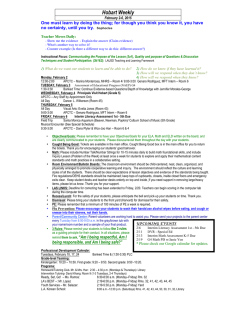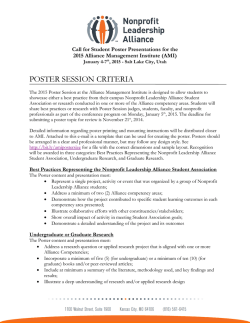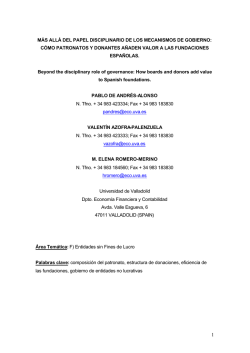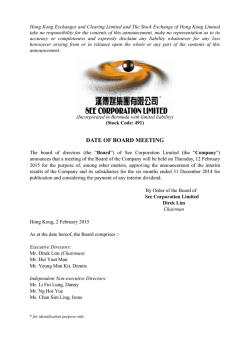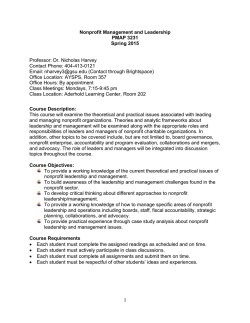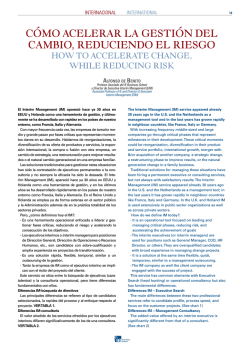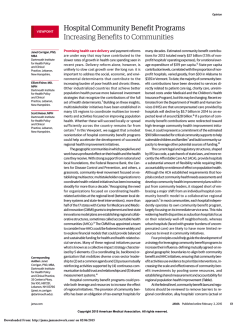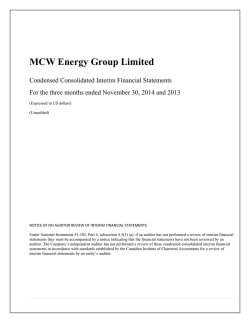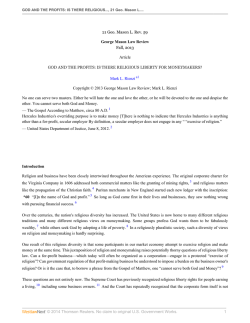
Why and How to Hire an Interim Executive Director
Common Ground A Publication of the N.C. Center for Nonprofits Volume XXI, Number 1 Winter 2012 What’s Inside Page Give retirement benefits to your staff 2 Nonprofit Awareness Month 2 Are you micromanaged? 3 Three nonprofit stars 4-5 Find appropriate funders 6 A volunteer hero 6 Social media = accountability 7 Ratios: good, bad, and ugly 8 Fiscal sponsorship? 9 Legal & legislative 10 You can do voter guides 11 Communicate well when something goes wrong 12 Your answers, savings, voice and network 13 Welcome, new Members 15 Join the Center 15 Policy advocacy made easy. Join us May 29-30 16 Good Stuff Free 16 Of Special Interest to Board Members Affordable retirement plans 2 Strong board and executive director relationships 3 2012 Public Policy Forum 16 Why and How to Hire an Interim Executive Director L eadership change is often marked with emotion, tension, and stress. If the director’s departure is forced, emotions may be particularly high for staff and board members. Externally, some funders, donors, and volunteers may take a “wait and see” approach, putting their support on hold. This can put a strain on resources, further taxing your nonprofit. Research suggests that a skilled interim executive director (ED) helps nonprofits to emerge stronger, more fiscally sound, and with higher levels of optimism. She takes the helm and lays the groundwork for the next leader’s success by: Serving as a bridge, giving the board time to conduct a thoughtful search process. Managing the day-to-day by examining the organization objectively, leading anxious staff, reassuring wary funders, and keeping finances and revenue generation on track. Helping the board clarify its vision and future leadership needs. Modeling excellence in management and leadership. Mentoring the new ED once appointed. mind. Your board should determine what’s most critical to the nonprofit’s success over the next few months. Identify urgent issues or challenges facing your organization. Review the departing ED’s job description, determine priorities for the transition, and draft an interim job description. Seek an interim ED with solid skills in management and transitions. This is more important than familiarity with your nonprofit or its field of work. Keep in mind that the assignment is temporary (usually four to eight months). The individual shouldn’t be a candidate for the permanent position. Realize that, due to the unique demands of the role, interim EDs are usually paid higher on an hourly basis than permanent EDs. But, they may be part-time or receive reduced benefits because of their temporary status. INTERIM CONTINUED ON P. 12 Some tips for hiring an Jeanie Duncan (left) shares a moment with Ashley Brooks, executive director interim ED are: of the Women’s Resource Center of Greensboro, at the N.C. Center’s confer Begin with the end in ence. Don’t miss your Public Policy Forum for Nonprofits on May 29 and NC Nonprofits Day at the legislature on May 30! Photo: JLS Photography Linking North Carolina’s Nonprofit Sector N.C. Center for Nonprofits Always on the Record: Crisis Communications E 3 very nonprofit needs a crisis management plan, even if it’s short and simple. Start by understanding the media. Reporters generally look for juicy stories and try to identify the heroes and villains. Media outlets compete to be the first to report a story, and reporters are under constant deadline pressure. They usually can’t wait for all the facts to come out. Your story will be reported, with or without your assistance. It's rarely wise to refuse to cooperate or to say, "No comment." It sounds bad and many will assume you are hiding something. And, there is no such thing as "off the record." If you say it, it's fair game. Some practical tips: Be clear about what you want the media to know. You control what you tell them. Always tell the truth. Mike Seymour and Simon Moore in their book, Effective Crisis Management, 1 2 call this advice the critical "Three Ts" speak to (Tell The Truth). about the Don't feel the need to tell the situation. media everything. This could That somebe dangerous, since reporters can one should pick sound bites that may hurt you be you or a when taken out of context. colleague Stick to the prepared text. who’s a Your fact sheet is an essential prepared, survival tool. It’s more than a list of effective talking points; it's your script. representa If you don't know, say so. tive of your Say, “I’ll get back to you.” organization Be sincere. Choose a spokes- Melanie Herman and posi person who is convincingly tion. trustworthy. Designate a backup Accommodate reasonable spokesperson in the event requests. If a reporter asks to your spokesperson is unavailable or tape a story in front of your building, is the subject of the crisis. Both the or hold an interview “on location” spokesperson and the backup should rather than an office, do so if you can be trained, articulate, sincere, and without jeopardizing your crisis persuasive. – Melanie Herman communications plan. Admit when a mistake has Adapted with permission of the been made. This may be the Nonprofit Risk Management Center first step to re-establishing credibility (NRMC), led by Melanie Herman. For and confidence more on this topic, see Vital Signs: with key conAnticipating, Preventing and stituencies. Surviving a Crisis in a Nonprofit Don't (www.nonprofitrisk.org/store/pub_detail. ignore asp?id=32). media requests The N.C. Center for Nonprofits is a or evade intersatellite office of NRMC and offers deep views. Playing discounts on its interactive tools for hide-'n'-seek can managing nonprofit risks. See www. do a lot of harm. ncnonprofits.org/benefits/nrmc.asp. The reporter will find someone to 4 5 6 7 10 8 9 INTERIM CONT. FROM P. 1 Tap local resources for potential candidates: retired EDs, college nonprofit degree programs, consultants serving the nonprofit sector, local nonprofit networks, and the Jobs Board of the N.C. Page 12 Center for Nonprofits (http://nccenter. brinkster.net). There’s great power and potential in this “neutral zone” – the space after one leader leaves and before a new leader begins. Transitioning nonprofits are more open to change. Leverage the opportunity! – Jeanie Duncan Jeanie Duncan, CFRE, is president of Raven Consulting Group in Greensboro and specializes in organizational transition and leadership development in nonprofits. Winter 2012, Vol XXI, No. 1
© Copyright 2026


